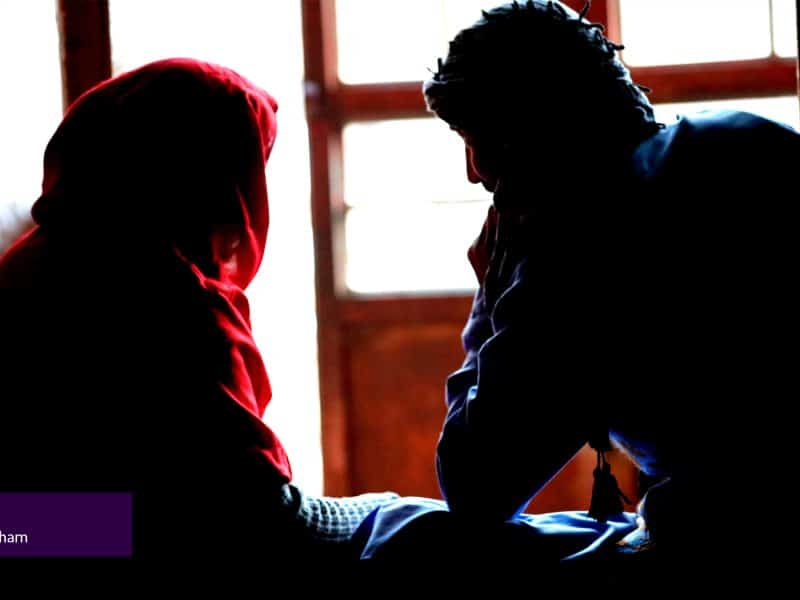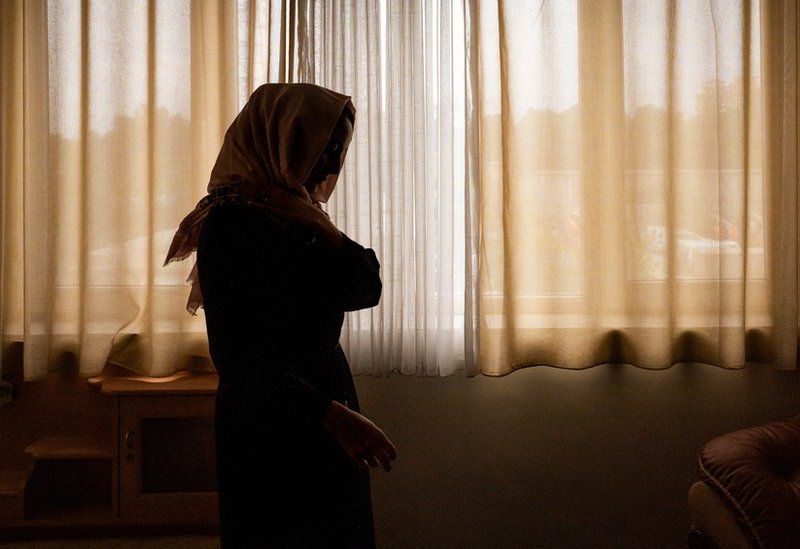by Ahmad Ahmadi*, Zahra Nader, and Farshid Aram* Originally published in Zan Times.

In late December 2023, 16-year-old Zahra* said a goodbye to her mother as she left home wearing a long, ankle-length dress. She went to her cousin’s shop in west Kabul, home to more than one million Hazara-Shias. Her mother didn’t see her again for two weeks.
“That night, Zahra didn’t come home. My husband called and said they are going to one of our relatives’ homes,” says her mother, Somaia*. “The next day, my husband came and said, ‘I am going to tell you something, but don’t make a scene.’ Then he told me that the Taliban had arrested Zahra and her friend from the shop.”
They were among the untold numbers of young women arrested for what the Taliban deemed to be violations of their dress code or “bad hijab.” In January, some of those women told Zan Times about their horrific experiences of detention, abuse, and torture in Taliban custody. Now, women and girls and the families of some of those arrested for “bad hijab” have told Zan Times that they were subjected to serious sexual violence and assault while in custody with devastating consequences. During its reporting from January to May 2024, Zan Times found that at least one died by suicide and the body of one other was found dead weeks after she was arrested.
Somaia says that Zahra and her friend were detained for two weeks before they were released. When she came home, Zahra was “not the girl who had left home two weeks before.”
“I ran and hugged her, but she cried and said, ‘I am dishonoured.’ For the rest of that day, Zahra didn’t eat or talk. She only sat in a room and cried. I couldn’t dare to ask about what had happened,” her mother says.
Amina*, a 22-year old medical student, says she spent three nights in a Taliban prison after being arrested in January 2024. She says she was interrogated by an older man who asked her about her menstruation and whether she was married or not.
“I fell on his shoes and begged him, ‘Please kill me, but don’t harass me’. He put his shoes over my head and said ‘Since you are keen to die, I will kill you, but before that, let us have fun with you’. Then he started touching my private parts. I fainted twice during the interrogation, but every time, he poured cold water over my head.”
Amina* says what happened to her happened to every girl taken to that interrogation room and left alone with the man.
“[Now] I can’t sleep at night, I am so scared and every time I see the Taliban soldiers, I faint,” she says. “I have tried to kill myself twice. Once I took all of my mother’s medication, but my family took me to hospital. Every time I remember that they touched me, I can’t bear living,” she says.
For Zahra, the ordeal she allegedly faced in prison proved too much for her to bear, says her family.
“In the middle of the night I woke up and noticed Zahra was not there. I woke up my husband and we started looking for her in all the rooms; my husband found her dead body,” says Somaia. “She had hanged herself.”
Zahra’s death was not the only tragedy linked to the Taliban’s arrest of women over hijab.
In December 2023, a 23-year-old university student from the same neighbourhood was also arrested under the Taliban’s hijab laws.
Marina Sadat had been on her way to the Farabi Institute of Health and Sciences, where she was studying midwifery, the only educational option available for women in the Taliban’s Afghanistan.
Twenty-two days later, her battered body was found inside a sack in a water canal in Paghman District of Kabul. Hamed*, who knows the family said she had been sexually abused. “It is just brutal that an alive, young girl goes to university and her dead body comes home,” he said.
The Sadat family’s ordeal didn’t end with the death of their daughter. Her parents, shocked and angered by the death of their eldest child, say they went looking for justice to the Taliban’s Ministry for the Propagation of Virtue and the Prevention of Vice, which is in charge of enforcing hijab rules.
“They went there four times, but the guard didn’t let them in and threatened them not to come again,” said Hamed. He says the family persisted, making it clear that they wanted justice.
Days later, he says that the Taliban raided their home when the family were out. Shortly after the family attempted to flee Afghanistan to Iran but were pushed back. On the way back to Kabul, their car was stopped by Taliban militants. Hamed said that the whole family, including four children, were arrested. “They tied their hands and blindfolded them,” he says. Five days later, the Taliban freed the children but her mother and father have not been seen since.
Ramzia, a women rights activist who was imprisoned by the Taliban in 2022, says that the Taliban keep a close eye on survivors and families of victims. “Even though I was freed from the prison, I was kind of in a house arrest,” she explains to Zan Times. “The Taliban were monitoring my every move. If I go somewhere, they would call me and ask where I am?”
She also speaks of an impossible choice survivors of sexual harassment and rape face in Afghanistan: “What I experienced in the prison was horrible, but you know what is worse than that? It is that we can’t speak about our experiences.”
“On the one hand, we are scared of the Taliban because they made us sign a letter that said we must not talk about our experience, not even with our families, and, on the other hand, there is our traditional society that won’t allow us to talk.”
Ramzia says she also had tried to kill herself twice after she was released from the Taliban prison: “What choices do we have left? To remain silent to the point of insanity or to kill ourselves.”
The Taliban’s Response
Initially, the Taliban officials confirmed the arrests in their “bad hijab” crackdown.
On January 4, a Taliban spokesperson for the ministry of vice and virtue told the Associated Press that the women who were arrested “violated Islamic values and rituals and encouraged society and other respected sisters to go for bad hijab…..in every province, those who go without hijab will be arrested.” Sources from Herat, Bamyan, and Daikundi provinces also confirmed to Zan Times that many Hazara-Shia women were arrested in these provinces as well.
One local councillor from Herat province told Zan Times that, based on the information he gathered from other local councillors, at least 27 women had been arrested in relation to hijab from Hazara-Shia neighbourhoods in the city from December 2023 to February 2024.
The UN Mission in Afghanistan reported that the arrests “predominantly” affected “Dasht e-Barchi, a Hazara-dominated area, with some also taking place in Khair Khana, which is mainly populated by people of Tajik ethnicity and communities from Panjshir.” The news met with local outrage and international attention.
Soon, the Taliban changed their version of the story.
On January 18, in an interview with Kabul-based Tolonews channel, Zabihullah Mujahid, the Taliban spokesman completely denied the arrests: “The arrests of women is not true, we have rejected it previously and we rejected it again.”
Five months later, on June 23, Mujahid tells Zan Times that there was no arrest made over hijab: “The issue was that some [Hazara] families in Dasht-e-Barchi reported to the ministry of vice and virtue that there are girls in their families who don’t listen to their advice. They are promoting unIslamic clothes that are produced by companies outside the country. Thus, vice and virtue was forced to go there and found a group of around 10 to 11 sisters, who were ordered to come to the closest police station with their fathers and brothers.” He emphasizes that it was only a two hours “advice” session given by scholars to inform these girls of the consequences of wearing unIslamic clothes. “Guarantees were taken from these sisters that they won’t do this again,” Mujahid insists. “This was not an arrest, it was being present in an office… This had happened at the request of the families.” In Khair Khana, a Tajik neighbourhood, he says, they were rounding up beggars, including women and children and this was wrongly “interpreted” as arrests over Taliban hijab rules.
He rejects the claims of sexual violence made in this report by women arrested over hijab: “The issue of rape is not at all possible because there is not one or two person [in the room and] when there is three person, such a crime would not happen.” He adds that it is “a very sensitive issue for the Taliban … I am sure such a thing did not happen.”
Zan Times investigation also found that the Taliban forced many Hazara-Shia mullahs and elders to reject and discredit the reports of arrests in staged campaigns organized by the Taliban intelligence services and vice and virtue.
During a spate of “bad hijab” arrests earlier in the year, one such gathering occurred on February 2 in the Jebrael area of Herat city, where many women were reportedly arrested. At the meeting, several Hazara-Shia elders and mullahs rejected all the media reports of the arrests. A local councillor told Zan Times that a few days before the gathering at the mosque, the Taliban Intelligence ordered him to be present at the mosque and bring as many people as he can.
Weeks later, one of the speakers told Zan Times that he was under Taliban pressure when spoke at the event and rejected the reports of arrests: “Two Taliban officials came to my office and asked me to speak in support of the Islamic Emirate; One of their key demands was to reject the media report and the UNAMA report [about Hazara-Shia women’s arrests over hijab].”
“There is no privacy or law in Taliban prison,” Ramzia, the woman activist said, “and there is no one who can question them or make them accountable. If we are raped, we can’t talk about it and our families are the first to ensure we remain silent.”
*Names have been changed to protect the identity of the interviewees and writers.
Freshta Ghani contributed to this report.
To subscribe to Zan Times, please click here.


